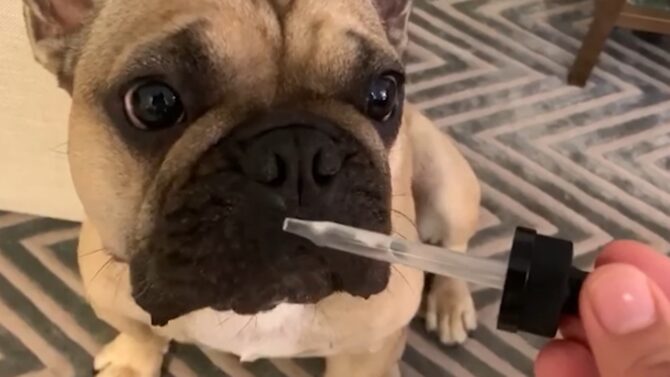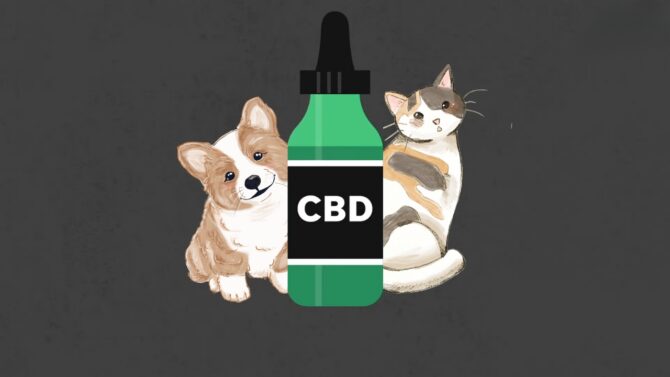In recent years, the conversation around CBD (cannabidiol) and its potential health benefits has expanded from human use to include our furry friends. As pet owners seek alternative treatments for their pets’ ailments, CBD has emerged as a popular choice due to its purported health benefits.
However, the world of cannabidiol for pets can be complex, with considerations around uses, dosage, side effects, and more. Today, I will discuss CBD for pets, offering a guide to help pet owners make informed decisions.
Cannabidiol In a Nutshell

CBD is a compound found in cannabis and hemp plants. Unlike THC (tetrahydrocannabinol), the psychoactive component found in marijuana, CBD does not produce a “high.”
Hemp plants, from which most pet-safe cannabidiol is extracted, contain no more than 0.3% THC. This distinction is crucial for pet owners to understand, as the safety and legality of CBD products often hinge on these THC levels.
For those interested in exploring the potential benefits of Delta-8 THC for their pets, especially in terms of relaxation and mood improvement without the intense effects associated with Delta-9 THC, HometownHero offers a variety of products tailored to meet these needs.
To learn more about their Delta-8 THC offerings and how they might benefit your pet, visit HometownHero for detailed information on their products and usage guidelines.
The Legal Landscape
CBD oil is now legal in most states, but it’s important to note that it is not FDA-regulated or approved for medical use in pets. This lack of regulation has led to variability in product quality, with some CBD products for pets found to contain heavy metal contamination or not have the claimed cannabinoid concentration.
The legality of CBD also means that veterinarians may be restricted in their ability to recommend CBD products, making it imperative for pet owners to conduct their research and consult with a vet before starting their pet on CBD.
Uses in Pets

1. Osteoarthritis and Pain Management
Research suggests that CBD may be beneficial for managing osteoarthritis and pain in dogs. A study sponsored by the AKC Canine Health Foundation is evaluating the use of CBD in treatment-resistant epileptic dogs, highlighting the growing interest in CBD’s therapeutic potential.
2. Anxiety and Behavioral Issues
Anecdotal evidence and preliminary studies suggest CBD may help with anxiety, noise phobias, and other behavioral issues in pets. The interaction of CBD with the endocannabinoid receptors in the nervous system is believed to produce these calming effects.
3. Seizures and Epilepsy
Limited research indicates that CBD may help control seizures in dogs with epilepsy. Ongoing studies aim to further explore this potential, offering hope to pet owners seeking alternatives to traditional seizure medications.
4. Atopic Dermatitis
CBD’s anti-inflammatory properties are also being investigated for their potential to help manage atopic dermatitis in dogs, providing a natural option for skin conditions.
Dosage Guidelines

One of the biggest challenges in using CBD for pets is the lack of standard therapeutic dosage. Dosages can vary widely depending on the size of the pet, the condition being treated, and the concentration of CBD in the product.
Starting with a low dose and gradually increasing it while monitoring your pet’s response is often recommended. Consultation with a veterinarian familiar with CBD is crucial to determine an appropriate dosage for your pet.
Side Effects and Safety
While CBD is generally considered safe for pets, potential side effects include increased appetite, sedation, dry mouth, lowered blood pressure, and drowsiness. More seriously, CBD can affect liver enzymes and may interact with other medications.
The safety and risks of using CBD for dogs have not been thoroughly researched, underscoring the importance of proceeding with caution and consulting a veterinarian before use.
Choosing a CBD Product
When selecting a cannabidiol product for your pet, look for organic, high-quality products with a certificate of analysis (COA) that confirms the cannabidiol content and verifies the product is free from THC and contaminants.
The method of CBD extraction is also important, with supercritical carbon dioxide extraction being the recommended method due to its ability to produce pure cannabidiol oil without harmful residues.
The Challenges of Cannabidiol Use in Pets

Despite the promising aspects of CBD use in pets, there are significant challenges that pet owners face. The market’s lack of regulation and standardization means that product quality can vary dramatically.
This section aims to guide pet owners through these challenges, ensuring their pets receive the best possible care.
Product Labels
Deciphering product labels is crucial when choosing cannabidiol for pets. Labels should indicate the amount per serving, the total content, and the type of cannabidiol used.
Full-spectrum CBD contains all the compounds found naturally in the plant, including trace amounts of THC. Broad-spectrum CBD contains multiple cannabis plant compounds but is THC-free. CBD isolate is the purest form of cannabidiol, containing no other cannabis plant compounds.
The Importance of Third-Party Testing
Given the lack of FDA regulation, third-party testing becomes an essential factor in verifying product quality and safety. Reputable CBD brands will provide access to third-party lab results or certificates of analysis (COAs) that verify the product’s CBD and THC content and screen for contaminants like heavy metals and pesticides. Pet owners should only purchase products with clear, accessible COAs.

Dosage Adjustments and Monitoring
The appropriate dosage of CBD for pets can vary widely. Factors such as the pet’s weight, the condition being treated, and individual sensitivity to CBD all play a role in determining the right dose.
After consulting with a veterinarian, it’s important to start with the lowest suggested dose and closely monitor your pet’s response. Adjustments should be made gradually, and any adverse reactions should prompt immediate consultation with a vet.
Potential Drug Interactions
CBD’s potential to interact with other medications is a critical concern. It can inhibit the enzyme system in the liver responsible for metabolizing many pharmaceuticals, leading to altered drug levels in your pet’s system. Before starting CBD, discuss your pet’s current medications with a veterinarian to assess any risks and adjust medication dosages as necessary.
FAQs

Can CBD Cause Toxicity in Pets if They Consume Too Much?
While cannabidiol is generally considered safe, excessive consumption can lead to potential toxicity, manifesting as lethargy, incoordination, or gastrointestinal upset. Immediate veterinary care is recommended if an overdose is suspected.
Is There a Difference Between CBD Oil for Humans and Pets?
This oil itself is the same; however, products formulated for pets often have lower concentrations of cannabidiol and may exclude ingredients found in human products that could be harmful to animals.
Can CBD Oil Be Applied Topically to Pets?
Yes, itl can be applied topically for conditions like skin irritations or joint pain. Ensure the product is designed for topical use to avoid irritants.
How Quickly Can I Expect to See the Effects of Cannabidiol on My Pet?
Effects can be seen as quickly as 30 minutes to an hour after administration, but consistent use over days or weeks is often required to see significant benefits.
Are There Specific Breeds of Dogs that Should Avoid Cannabidiol?
There is no breed-specific prohibition against cannabidiol, but individual health conditions, such as liver issues or certain genetic predispositions, may warrant caution. Always consult with a vet first.
Can CBD Help with My Pet’s Allergies?
It may help manage some symptoms of allergies in pets, such as inflammation and itchiness, due to its anti-inflammatory properties. However, it’s not a cure and doesn’t address the underlying cause of the allergy.
Final Words
CBD for pets offers a promising, though still largely unexplored, avenue for the treatment of various conditions.
Despite the anecdotal evidence and preliminary research supporting its use, the lack of FDA regulation, standardized dosages, and comprehensive safety studies means that pet owners must exercise caution.
Consulting with a veterinarian, choosing high-quality products, and starting with low dosages can help mitigate risks and ensure the best outcomes for your pet’s health and well-being.




